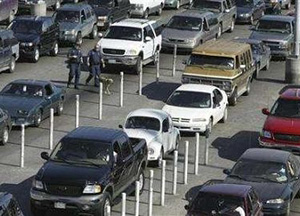San Miguel de Allende, Mexico - Auto vendor Alejandro Villalobos parked a green 2002 Toyota Sequoia with 90,000 miles outside a shuttered supermarket which doubles as a used car lot one day a week.
Villalobos priced the SUV at 110,000 pesos - roughly $8,500 - and wrote a single word on the windshield: "Legalized."
Mexico has about 6 million foreign-made cars on its roads, and many are used cars and trucks that are simply driven over the border from the United States and not registered here legally.
Mexicans like them because they cost less to buy than legalized cars, which go through a bureaucratic process in which the importer must pay a duty and a sales tax. But Mexico's auto dealers say the illicit trade in "junkers" as they call the mostly U.S. cars is ruining their used-car businesses.
Eduardo Solis, president of Mexico's Automotive Industry Association, says U.S. clunkers clutter the country and have driven down the price of new and used cars. He says Mexico's auto dealers sold 10 new vehicles for every 1,000 people in 2002. That number is now 8 new vehicles for every 1,000 people, while the average vehicle age is 15 years old.
Federico Estevez, professor of political science at the Autonomous Technological Institute of Mexico, says such cross-border black market sales have been going on for decades. "It's an ancient trade here," Estevez says. "It probably started with the Model T."
At one time Mexico had a closed auto market, meaning Mexicans could only buy cars made in Mexico, most famously the Volkswagen Beetle that was being manufactured in Mexico long after production ceased elsewhere in the world.
The closed market cut of competition and made car prices artificially high and often prohibited the poor from owning one. This encouraged illegal importations, Estevez said. The flow of illegal imports was modest at first, but keeps rising, he said.
Meanwhile, Mexico's automobile manufacturing industry has been expanding. Many of the world's biggest car-makers have factories here producing vehicles for customers in Latin America and the United States. Plants in Mexico produce more than 200 vehicle models from 14 manufacturers.
Yet many of the country's vehicles continue to stream illegally in from the north, driven by Mexicans who bought them in the United States and find ways to skirt the motor vehicle department. Some of the trade is organized, says Estevez.
The vehicles are known as "chocolates," Mexican slang for something shadowy. Mexico's auto manufacturers and dealers say they exist due to corruption in customs posts and the courts.
Many Mexicans bring back pickups they used for work in the United States, while farmers bring in agricultural vehicles. As the quantities have grown, some political candidates have taken up the issue for votes, promising amnesties for the chocolates.
"It's political business," Estevez says. "You can't further subsidize their low productivity on the farm so you give them a boost in income ... through the sale of other capital goods."
The lax enforcement and promises of amnesties have only encouraged more importations, Estevez says. It has also given rise to exploitation of the "chocolate" owners.
Farmer and social activist Julian LeBaron, who lives in the border state of Chihuahua, says some politicians promise the illegal importers that they will help them avoid paying import fees duties in exchange for political support.
LeBaron alleges that people there are forced to pay bribes to police and other authorities to keep driving unlicensed vehicles, which is made easier because Mexico does not require motorists to have car insurance. He estimates one-third of the vehicles in Chihuahua are chocolates, including one he owned until it was recently seized.
These drivers are "an open target for the (police) ... who will throw them in jail for getting around in these cars," says LeBaron, who has led protests near the New Mexico border over police corruption.
Farm area residents in Chihuahua and other places drive "chocolates" because new and used cars cost too much in Mexico, LeBaron says. Mexico's auto dealers disagree.
Guillermo Rosales, spokesman for Mexico's Automotive Distributors' Association, says new car prices before taxes are competitive with those in the United States. The same goes for used car prices, Rosales says.
But there are other reasons why Mexicans prefer the cars from their neighbor to the north.
Villalobos says the green Sequoia he got at a Florida auction is like most imports of better quality than what is commonly sold in Mexico. Cars in the USA are driven on better maintained highways, he says, and are far less likely to have used adulterated gasoline, or gas that has been blended with harmful distillates by unscrupulous fuel providers to increase profit.
Villalobos says he paid $1,300 to legalize the car and expects to make $1,000 in profit.
"It's a better deal" than what's being offered by auto dealers, he says.


